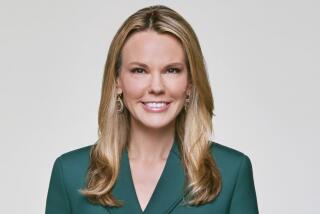In Viacom’s Split, Moonves Now Looks Better by Half
- Share via
When media mogul Sumner Redstone split his entertainment empire, Viacom Inc., into two publicly traded companies this year, observers sneered that CBS Corp. Chief Executive Leslie Moonves got the short end of the stick.
Moonves had wanted to be in charge of the venerable Paramount Pictures movie studio. Instead, his new portfolio contained the company’s less glamorous, slower-growth assets: the CBS network, a TV production arm, a troubled radio division, billboards, theme parks, cable channel Showtime and the Simon & Schuster publishing house.
Some company insiders even snickered that Viacom had been divided into “ViaMore” and “ViaLes,” a not-so-subtle dig at Moonves.
Now, Les seems to be more.
Redstone’s firing Monday of Moonves’ counterpart and corporate rival, Viacom Chief Executive Tom Freston, left no doubt which of the two executives had won. In the eight months since each was handed a piece of Redstone’s empire to run, CBS’ stock has gone up 9.2% while Viacom’s has slid 16%.
“The split worked, clearly, for CBS,” Redstone told analysts on a conference call.
Redstone said it was too soon to mull over whether to put Viacom and CBS back together again. He said it would take at least a year to evaluate whether dividing the company -- aimed at better unleashing each company’s value in the market -- had been a success.
CBS has increased its market value partly because Moonves, 56, has been working tirelessly to prove himself to Redstone and Wall Street.
“Moonves has done a good job out of the gate, communicating a coherent strategy to investors,” said Lowell Singer, media analyst with SG Cowen.
Even before the split was final, Moonves announced that CBS was buying a small cable channel, College Sports Television, in an attempt to diversify the company’s revenue and court technologically savvy students and college graduates. CBS then broadcast NCAA basketball finals on the Internet, drawing about 19 million views.
Moonves also:
* Shut down the UPN broadcast network, which over the years had lost nearly $2 billion, to go into business with Warner Bros. Entertainment. The two companies formed a new network, the CW, which will launch this month.
* Hired Katie Couric, NBC’s morning star, who debuted Tuesday night as the anchor of “CBS Evening News.” Moonves aims to shake up a news division that has been a ratings laggard and been mired in controversy since the 2004 discredited report by former anchor Dan Rather on “60 Minutes II” about President Bush’s National Guard service.
* Pushed CBS further into digital opportunities. CBS agreed to form a partnership with Comcast Corp. for a video-on-demand service using several popular CBS shows. The media company then started its own Internet broadband “channel” called Innertube. And on Tuesday, CBS said it was teaming up with TiVo Inc. to offer a preview of the pilot of one of its new fall shows, “The Class.”
In an interview Tuesday, Redstone praised Moonves, saying that the executive would not have squandered the opportunity to buy the online social networking juggernaut MySpace.com. Under Freston, Viacom lost out on that deal to Rupert Murdoch’s News Corp.
“Les would not have hesitated; he would have grabbed it,” Redstone said.
Moonves declined to comment Tuesday.
A slew of challenges, notably that CBS’ holdings still are heavily dependent on advertising that is vulnerable to an economic slowdown, lie ahead, said media analyst Harold Vogel. About 75% of the company’s revenue comes from advertising.
“Moonves is looking just fine now, but he hasn’t faced the same problems that Freston had,” Vogel said, pointing out that Freston became a victim of a slump in cable advertising.
CBS also is vulnerable if more consumers turn to digital video recorders such as TiVo to skip commercials, and the Internet continues siphoning ad dollars from broadcasters.
“CBS is a great franchise, but the fact that the vast majority of revenue is advertising-based is a significant challenge” for the network, said Jeffrey Logsdon, a media analyst with BMO Capital Markets.
“Now, you have a great big 500-pound gorilla in the Internet that is fragmenting advertising even quicker.”
*
*
Times staff writers Richard Verrier and Sallie Hofmeister contributed to this report.
More to Read
The biggest entertainment stories
Get our big stories about Hollywood, film, television, music, arts, culture and more right in your inbox as soon as they publish.
You may occasionally receive promotional content from the Los Angeles Times.











